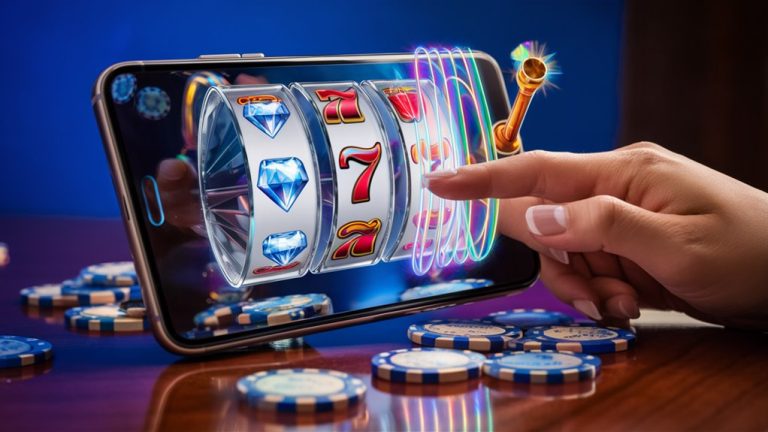
The Gambling Revolution
The gambling revolution 40,000 years ago started from the earliest dice game indeed has been the walk from mass hunger to hunger for wealth and process of social change. With this time journey, one could see mankind’s fanatical pursuit of chance and games.
Ancient Origins of Gambling Games
The rise of traditional casinos
Early Mesopotamian Gambling History
Digital Transformation and Modern Innovation
In the 1990’s Internet era, the new digital technology has basically rewritten the map of gambling. Starting from the launch of Microgaming’s online casino software in 1994, all gambling nowadays is virtual. They feature blockchain security, artificial intelligence algorithms, and lifelike virtual reality is yet to turn on its own more than ten years in the making. These developments are bringing casino gaming culture into another phase of existence. This is a world that invites its players to explore before they ever set foot on any casino floor!
Future of Digital Gambling
Contemporary gambling continues to evolve through technological advancement, with innovations in mobile gaming, cryptocurrency betting, and augmented reality experiences. These developments suggest that the gambling industry is poised for unprecedented transformation, promising yet more sophisticated and secure gambling experiences.
Genetic Gaming History
In addition to Sumerians and Babylonia, who placed great value on gambling articles, there also existed the six dice. These represented the astragali. Four-thousand brought both gambling and religious divining tools to sumptuous heights. These items once served both functions at once.
Lanuh Former Indian and Chinese Natural Monopolies Among the gambling activities of ancient Egyptians was the emergence in 2000 BC of Senet and other board games. Apparently when numbers were used liberally none of them meant anything anymore, though at that time this transition from religious ceremony to popular wagering benefitted both gods and men alike.
At the same time Chinese gambling culture blossomed. During the Xia dynasty (2000/1500 BC) new methods of betting were put forward such as tiles and paper flaps (primitive playing cards). With these they laid the foundation for ancient sports world gambling.
The Evolution of Gambling Culture in Greece and Rome
The three civilizations played a pivotal role in improving gambling culture with their development of more sophisticated betting methods. Against this backdrop, bets were established on animal fights and chariot races; popular social games such as dice-based games like Tali and Tesserae got a tremendous boost across different social levels.
In ancient Rome specific laws were passed to regulate gambling.
Nevertheless, these banned such as were liable to arrest completely at a stroke on winter quarter and only permitted all classes of people to compunction racing and military competition. Lasix occurred within the bounds of its own kind: Games of chance. Top In-Game Wagering Sites
American gambling establishments became prominent along their own distinctive paths, from Mississippi riverboat casinos where uniformed staff catered to urbane Easterners, to frontier saloons in the expanding West that catered to wagering and gunplay at once. In this pioneering era, Nevada was known as the “Divorce Capital of the World.” This was because although its gambling was illegal elsewhere in America, it did actually have some legal aspects and following newer laws for steady girlfriends’ sake, you could get a divorce here.
The defining moment came in 1931, when Nevada’s risk-taking government legalized gambling, turning Las Vegas from a desert oasis to an international gaming center of the highest world status.
The 1940s and 1950s brought revolutionary changes as characters like Bugsy Siegel combined gambling with fashionable living quarters, entertainment and high-priced dining – doing away with the separate activity that actually took place in a casino’s operating room for convenience to gambling patrons. This was how today’s modern gambling establishment (20th-century model) took shape.
From a couple of initial examples in Venice, the rise of gambling houses is a truly amazing transformation story. It’s radically changed the global picture of entertainment and tourism.
The Digital Gaming Revolution
At Home, Computers Enter
The digital revolution for the casino and betting industries began in the 1980s when home computers first entered American households.
The change from simple video poker machines to sophisticated internet platforms forever altered the face of the gaming industry.
Though the industry in general remained much the same, Microgaming turned everything upside down with its 1994 online casino software development – the first ever.
The Digital Explosion (1996-2000)
InterCasino’s 1996 launch set off a bonanza in digital gaming.
After 2000, the industry was expanding at an extraordinary pace. There were some 700 casinos around the world (mainly online), with $2.2 billion in annual revenue.
The founding of live dealer games in 2003 revolutionized traditional land-based casino experiences for an entire generation of players.
Innovations onto the Cutting Edge of Modern Gaming
Mobile Gambling Apps and Cryptocurrency Integration
Now that mobile gambling apps and cryptocurrency payment systems are within everyone’s reach, a whole set of new transaction modes have opened up.
Table technology changes dramatically:
Security protocols
System transparency
Payment processing efficiency
Virtual Reality Application and the Future of Technologies
Thanks to the digital revolution, gambling has been democratized – the access to the Internet has made that possible. And yet there are other things that need to be considered for gambling to grow responsibly as well as unfold healthily: Responsible gaming Marketable. This digital revolution is still helping shape the future of gaming with other technological advances that are balanced by traditions carried over from our social past. Do They Really Increase Your Chances?
Mobilizing Gaming Becomes the Primary Market
Even before mobile! Regular gamblers might like to know where this all started from… By Guerilla Warfare. The pioneer of mobile gambling in 2005 was Juul Company, Beijing, China. It launched its off-shoot product in English for international markets, and mobile gambling was born.

Taking the Lead from Early Mobile Gambling
This important breakthrough in digital gambling accessibility changed mobile gambling’s history. Today’s wireless bookie platforms are built on these primitive applications.
For mobile phones, this preceded the development of HTML5, and what was truly a basic application was, in fact, also a major innovation.
The Most Basic Functions of These Early Solutions
Are you waiting for a beta? The 2008 launch of the Apple App Store was followed by Google Play in 2012. Now products of digital revolution could be produced en masse and rapidly expanded into app territories that had previously been unproven. It was significant to note that by 2015 mobile gambling surpassed traditional computer betting for the first time.
Mobile-responsive Design from Head to Toe
The industry’s biggest turning point came in 2014 with HTML5 technology.
CURRENT LANDSCAPE FOR MOBILE GAMBLING
Industries where people can bet with their phone today: live casino betting, sports gambling, and slot machine betting. In most of the major markets, over 70% of all digital bets are placed this way.
Living Social Life Mobile betting nowadays requires even more advancement when gambling on mobile. Meanwhile, the development of mobile-optimized interfaces: Live dealer platforms and social gambling features Cryptocurrency payment methods.
Future Emerging Technologies for Mobile Gambling
In today’s mobile gambling sector, sharper technologies are beginning to emerge – science fiction tomorrow reality, the day after tomorrow reality.
Augmented reality betting experiences Everywhere 5G Contains very advanced mobile payments. Fast & Secure Options
Given limited resources, this should be code-named TaylorZRoss System installation. When you pursue that kind of thinking, however… Mobile-based Remote Virtual–how should we keep Consortium concerts going?
Future Developments and Techniques for Mobile Gambling
Although the realm of technology is constantly evolving and remains mostly ad hoc, it is these very capabilities that bode well for mobile gambling within digital entertainment’s larger sphere.
Revolutionary VR Technology for Casino Gaming
Virtual reality gambling has profoundly changed the world of betting after it appeared on the stage in 2016 with applications like SlotMillion VR Casino.
From basic 3D environments to photorealistic virtual casinos in which live dealers work around the clock and players come and go as they please, the technology has evolved.
Today’s VR gambling platforms let you experience real casinos, so that you can wander through a virtual gaming floor and play slots. You could participate in table games, complete with unprecedented realism.
Segment 2: Capitalizing on Straight Up Enhancements and Growing Trends
The market for VR gambling has seen traditional casino games disappear and replaced by everything but.
Premium viewing experiences are brought to virtual sports betting arena spectators with integrated betting facilities, and several groups of multiplayers can meet in a social casino environment.
Bingo. The feel of the tactile opens the door to innovation and creativity.
Haptic feedback technology, precision motion tracking systems, and cards played on tables now surpass what was possible at a normal brick-and-mortar casino.
The VR gambling market is determined by the convergence of such trends. There is only one word that comes into it – power. The power of VR gaming not only apparent from human-like facial behavior but also higher economic value and industry status.
Future Development Trends for Online Betting Platforms
The Future Development Trend of Online Betting companies and platforms in 2025. 먹튀검증사이트
Revolutionary Blockchain Technology for Betting
Online betting instruments various transparent technology and security measures to help facilitate the popularization of a new financial model among young gamblers and entrepreneurs.
Instead of centralized payment systems, decentralized ones powered by blockchain technology record transactions and employ cryptocurrencies for seamless payments or money transfers across international boundaries. These innovations set up the new standard for secure and rapid deposits and withdrawals in the betting industry.
Applications VI. Upgrades in Intelligence as Presented by the “Client” and AI & Machine Development
Artificial intelligence and machine learning techniques are profoundly changing the betting operations.
Sophisticated fraud detection mechanisms are integrated to secure platform integrity, with the result that advanced systems can offer betting information customized just for you based on your behavior and patterns.
The introduction of social betting features has led to collaborative betting communities, where betting strategies can be shared and participants are oriented in real-time to the match.
Immersion in Technology
Augmented Reality (AR) Development
Another technology that is changing sports betting now is Augmented Reality. For example, people using AR technology find that betting platforms take on a tangible form in which they can interact with them to some extent or other. The combination of AR and betting applications provides a much more vivid presentation of betting markets and live data.
Voice Systems
Voice-operated betting, the next big thing in user interface design ever since 2025, betting will be done by voice. Free from man-machine contact, everything can be done according to spoken command and voice recognition technology.
Highly Technical Infrastructure
Smart contract processing replaces decision-making in payouts and dispute resolution to deliver guaranteed, secure transactions instantly.
Risk Assessment
Quantum computing applications reinvent odds calculations and risk assessment to create betting markets that are not just more accurate but also fundamentally different. In general, the integration of technology makes life more elegant, convenient, user-friendly, and efficient.





